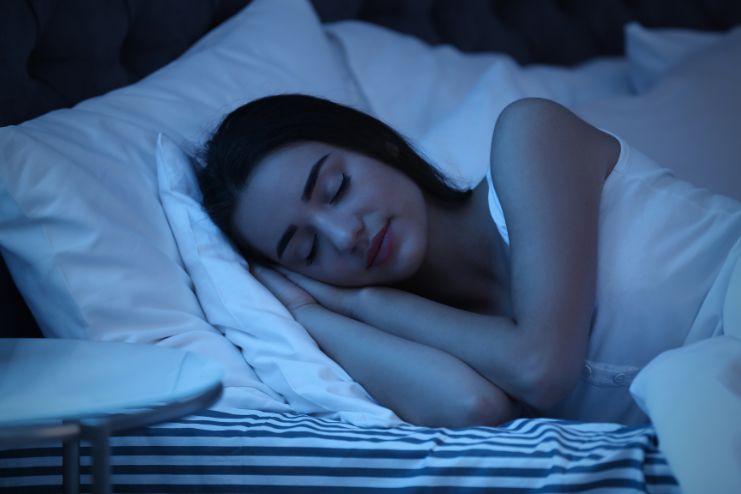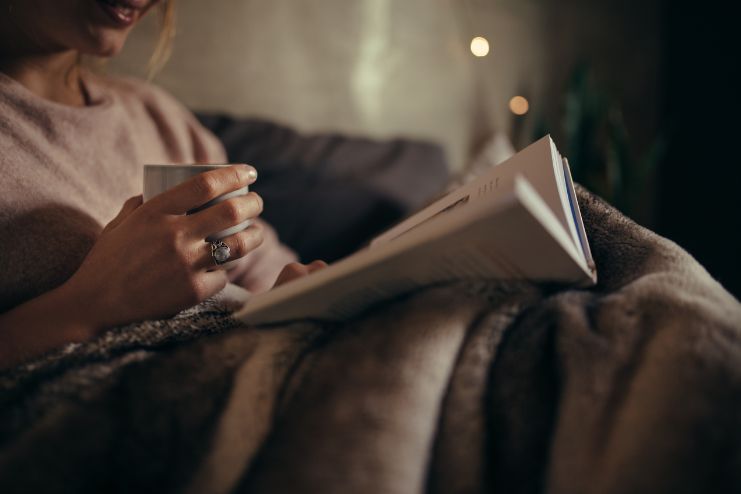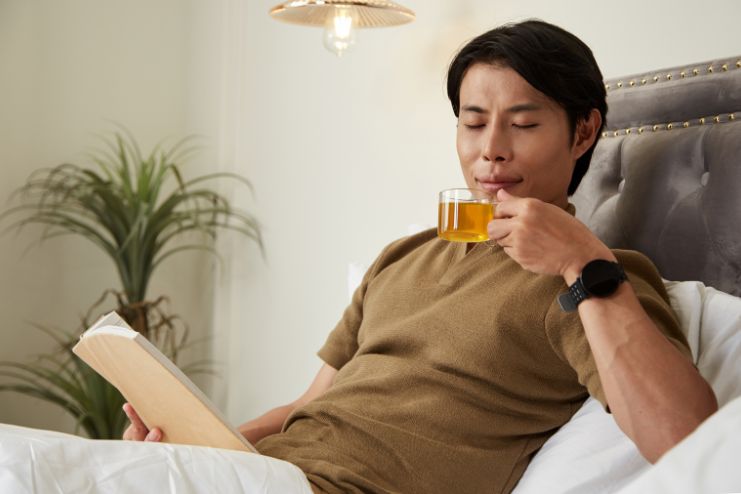Affiliate Disclaimer
Some links in this article are affiliate links. We may earn a small commission if you make a purchase through these links, at no extra cost to you. We only recommend products we find useful to our readersHave you ever wondered how highly successful people maintain their energy, focus, and resilience day after day? The secret isn’t just in their morning routines. It starts the night before.
A restful night’s sleep is the foundation of peak performance, mental clarity, and emotional balance. By developing purposeful bedtime rituals, successful individuals prime themselves for a productive and fulfilling day ahead.
Your evening routine isn’t just about shutting down; it’s about setting yourself up for success. Let’s explore the habits that high achievers use to optimize their sleep and maximize their potential.
Read More: Polyphasic Sleeping – Can Shorter Sleep Cycles Improve Productivity?
5 Habits for a Restful Night’s Sleep
If you are among those people who struggle to sleep, we’ve got you covered. Read on to learn a few effective tips to get that restful sleep you’ve been dreaming of for ages.
1. Establishing a Relaxing Environment

Creating a Comfortable Sleep Space: Establishing a perfect sleeping environment is the secret to a good night’s sleep. By carefully planning your sleeping area, you can establish a peaceful sanctuary where the mind and body can both rest and recover.
Start by selecting a mattress and pillows that provide adequate support so that your body remains aligned for a good night’s sleep. Ensure your sleeping space is uncluttered, as an organized space relaxes the mind and frees the body of daily stress. Incorporate calming factors such as soft lighting and soothing colors. Soft, soothing light tells your body it’s time to relax, and muted blues and pale greens lead to peace.
Try this Sleep Innovations Dual Layer 4 Inch Memory Foam Mattress Topper for comfortable sleep.
Dimming Lights and Reducing Screen Time: Bright screens from smartphones, tablets, and computers interfere with the body’s sleep-wake cycle by emitting blue light. This blue light suppresses melatonin, a hormone that helps regulate sleep, making it harder to fall asleep and reducing the quality of sleep.
By reducing ambient light and restricting screen time, you signal your body that it is time to relax. Dimming the lights promotes melatonin production, and restricting screen time permits your body’s natural sleep mechanisms to operate. These easy changes allow you to fall asleep faster and enjoy better sleep, establishing a calmer setting for both body and mind.
Read More: Top EMF-Blocking Devices for Better Sleep & Reduced Radiation Exposure
2. Unwinding Activities

To sleep well, relaxing before retiring for the night is essential. Try some of these activities to help you unwind.
Reading a Book: Reading before sleeping helps the mind shift away from the things on your to-do list into a quieter space.
Journaling or Reflecting on the Day: Journaling releases any worried thoughts that may be stuck in the mind, clearing up mental space for relaxation and peacefulness, thus making it possible to relax and get ready for sleep. Check out one of our favorite journals here.
Gentle Stretching or Yoga: The body can feel tight and tense at the end of a stressful day. Simple stretching or a few yoga poses relax larger muscles and increase flexibility.
Using Relaxation Techniques: Meditation and deep breathing calm the mind, reduce stress, and prepare the body for deeper and more restful sleep.
3. Mindful Bedtime Routines

A key part of creating a restful night’s sleep is establishing mindful bedtime habits.
Setting a Consistent Bedtime: The body thrives on routine, and a regular bedtime helps regulate the sleep-wake cycle. By sticking to a set bedtime, you signal to your body that it’s time to wind down and prepare for rest. This simple habit lays the foundation for healthier sleep patterns.
Limiting Stimulants Like Caffeine and Alcohol Before Bed: Caffeine and alcohol in the hours leading up to bedtime interfere with the normal sleep process, affecting both the quality and duration of sleep. Establishing a cut-off time for the stimulants can protect your sleep hygiene, enabling the body to transition into various sleep cycles without disruptions.
Practicing Gratitude or Positive Affirmations: Incorporating techniques such as gratitude or positive affirmations before bed might lead to a happier and calmer mental state.
Read More: Best Foods to Eat Before Bed for Deep Sleep & Muscle Recovery
4. Tech-Free Wind Down

A gadget-free wind-down process is essential to improved sleep. It allows you to move away from the digital realm and establish a relaxing environment before bedtime.
Putting Away Electronic Devices: The blue light emitted by screens disrupts melatonin, a sleep-inducing hormone. When you store away your phone, tablet, or computer, you establish a physical barrier. This makes you step away from technology and tells your body it’s time to unwind.
Avoiding Work-Related Tasks or Stressful Activities: The closing moments before going to sleep are not the appropriate times to tackle challenging work tasks or engage in activities that cause stress. By intentionally avoiding such duties, individuals can maintain a sense of mental serenity, which makes it easier for them to transition into a state of relaxation, which is necessary for sound sleep.
Using White Noise or Calming Music for Background Sound: White noise or soothing music serves as calming companions, blocking out any disturbances from the outside world and creating an atmosphere of tranquility. You can buy an amazing white noise machine here.
5. Bedtime Self-Care Practices

The foundation of getting restful sleep is intentional self-care before bedtime. Establishing a calming bedtime routine relaxes both body and mind.
Skincare Routine or Warm Bath: The gentle touch from your evening skincare rituals or the heat of a warm bath relaxes the body. These simple rituals cue that it’s time for sleep, making them a good addition to a bedtime routine.
Sipping Herbal Tea or Warm Milk: Several herbal teas, including chamomile and lavender, are known to have inherent calming effects that are beneficial to relaxation. Similarly, warm milk includes tryptophan. The amino acid helps the body produce serotonin and melatonin, which helps the body transition into a more relaxed state of sleep.
Practicing Progressive Muscle Relaxation or Body Scan: Progressive muscle relaxation and body scanning are two good methods to release physical and emotional tension. Both of these techniques either contract and then release various muscle groups or scan the body for where it is holding tension. Both of these activities release built-up stress, leading to deeper relaxation and getting the body ready for a more restful and restorative sleep.
Read More: How to Reset Your Circadian Rhythm for Better Energy, Sleep, and Focus
Conclusion

A well-designed bedtime routine is the key to truly restful sleep. By adopting deliberate pre-sleep routines, people can establish a soothing nighttime atmosphere that cares for both body and mind. Each small, deliberate ritual—stretching, reading, or mindfulness—signals the body that it’s time to relax.
As you bid goodnight to the day, look into alternative evening routines and find what will suit you best. Tailoring your sleep ritual guarantees a routine, rejuvenating, and thoroughly satisfying sleep. Begin tonight—pick one new habit and stick to it. The payoff? More restful sleep, brighter mornings, and a more revitalized you. Sweet dreams!
-
Mar 2024Written by Ankita
-
Apr 2025Edited by Vaishnavi
References
- https://www.cnet.com/health/sleep/create-the-perfect-environment-for-the-best-sleep/
- https://vailhealthfoundation.org/news/tips-for-adjusting-sleeping-patterns-while-at-home-more/
- https://www.sutterhealth.org/health/sleep/screens-and-your-sleep-the-impact-of-nighttime-use
- https://mynewstouse.com/stories/smart-lighting-solutions-to-combat-eye-strain-from-screen-time,37158
- https://www.helpguide.org/articles/stress/relaxation-techniques-for-stress-relief.htm
- https://jainworld.com/philosophy/others/preksha-dhayan/transmutation-of-personality-through-preksha-meditation/the-practice-of-deep-breathing/?
- https://www.sos.org/meditation/learn-meditation/
- https://www.healthline.com/health/benefits-of-reading-books
- https://www.edutopia.org/article/benefits-reading-fun/
- https://journey.cloud/reflective-journal
- https://medium.com/@cecilledesma_20547/reflect-with-these-end-of-day-journaling-prompts-3ee16f69266
- https://www.realsimple.com/health/fitness-exercise/stretching-yoga/yoga-poses-for-muscle-tension
- https://www.prevention.com/fitness/workouts/g30417941/best-yoga-stretches/
- https://www.healthline.com/health/daytime-sleepiness/set-a-consistent-sleep-schedule
- https://www.sleepfoundation.org/sleep-hygiene/how-to-reset-your-sleep-routine
- https://www.vively.com.au/post/understanding-the-sleep-stimulant-connection
- https://www.sleephealthfoundation.org.au/sleep-topics/caffeine-food-alcohol-smoking-and-sleep
- https://positiveaffirmationscenter.com/affirmations-for-gratitude/
- https://selfpause.com/affirmations/affirmations-and-gratitude/
- https://health.clevelandclinic.org/put-the-phone-away-3-reasons-why-looking-at-it-before-bed-is-a-bad-habit
- https://www.piedmont.org/living-real-change/using-electronic-devices-before-bed-can-ruin-sleep
- https://www.ncbi.nlm.nih.gov/pmc/articles/PMC8466496/
- https://psychcentral.com/stress/stress-related-insomnia-how-to-stop-stressing-about-work-finally-fall-asleep
- https://www.forbes.com/sites/johnhall/2019/07/07/work-keeping-you-up-at-night-6-ways-to-ease-your-mind/
- https://sleepdoctor.com/noise/sleep-sounds/
- https://www.sleepfoundation.org/noise-and-sleep/music
- https://www.realsimple.com/health/preventative-health/sleep/sleep-bath-study
- https://www.realsimple.com/night-skin-care-routine-8408161
- https://www.health.com/condition/sleep/7-bedtime-behaviors-that-will-help-you-sleep
- https://www.sunbeam.com/on/demandware.store/Sites-sunbeam-Site/default/Content-Show
- https://edition.cnn.com/2020/08/11/health/teas-for-sleep-wellness/index.html
- https://www.sleepfoundation.org/sleep-hygiene/relaxation-exercises-to-help-fall-asleep
- https://kripalu.org/resources/body-scan-practice-relax-your-nervous-system-and-help-you-sleep














